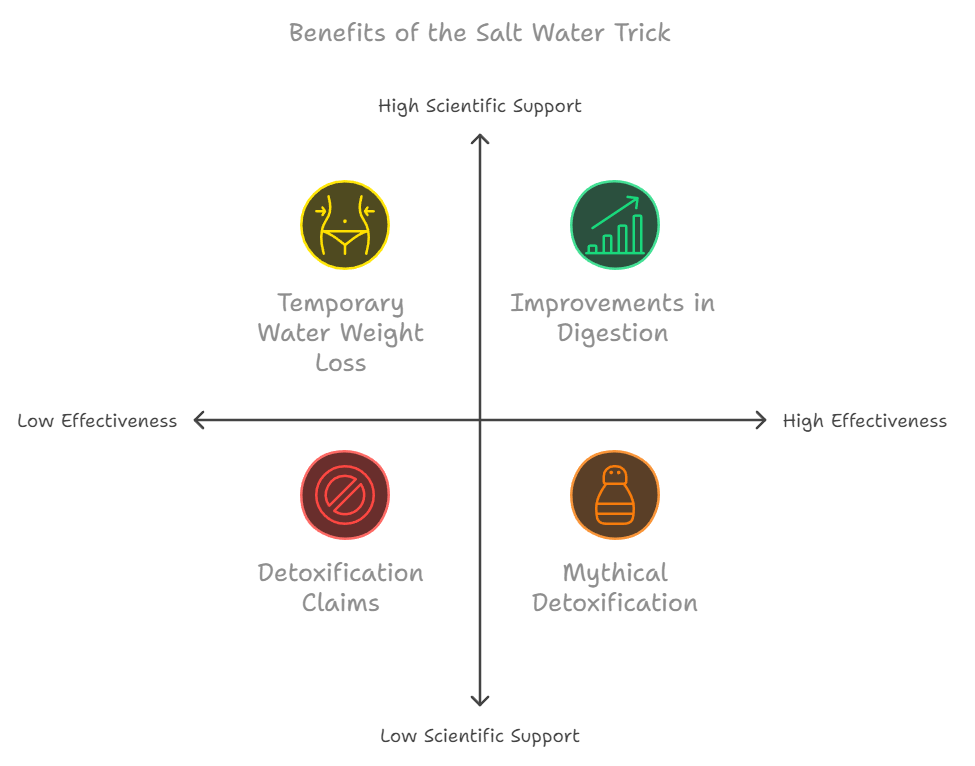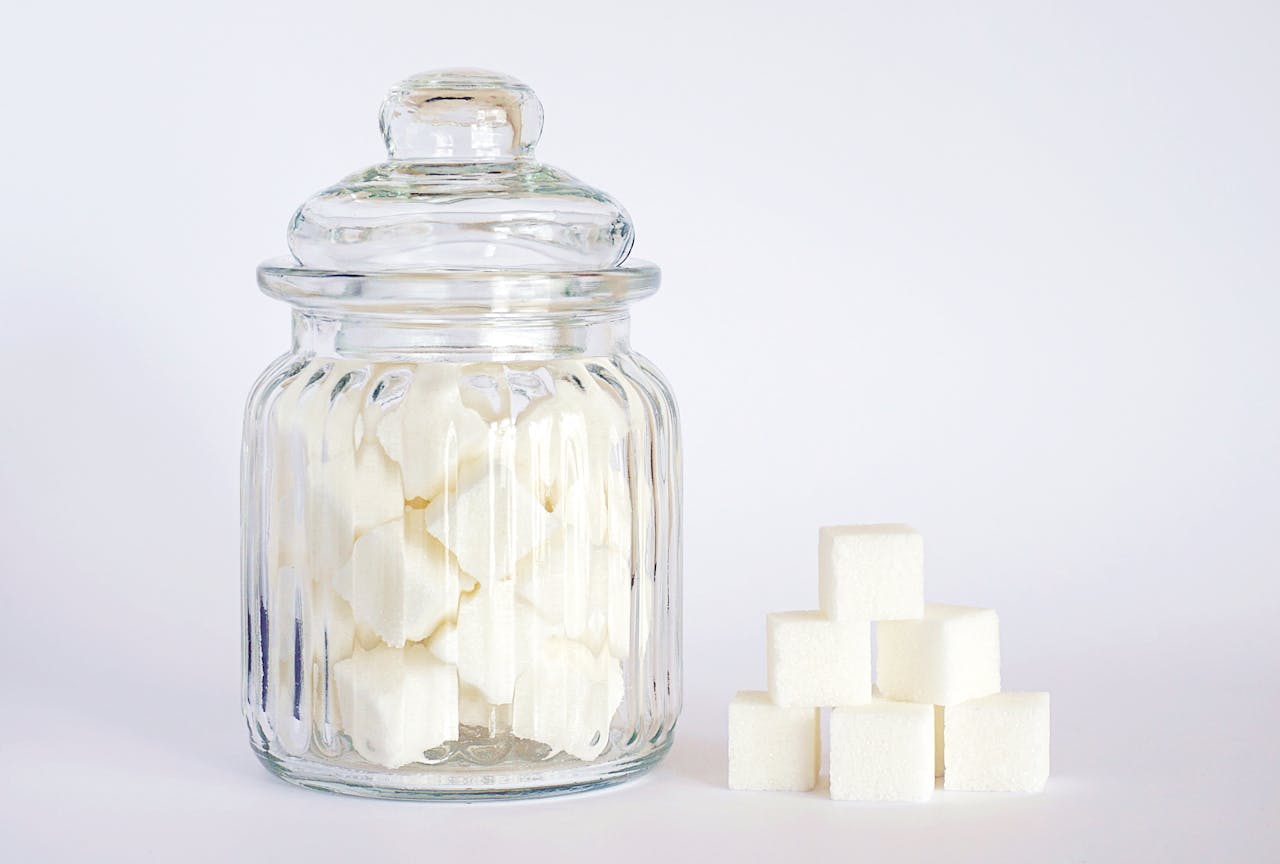13 Salt Water Trick for Weight Loss: Does It Really Work?
Weight loss is a journey filled with various methods and strategies, each promising quick and effective results. Among these, the salt water trick for weight loss has gained considerable attention. But does it truly work, or is it just another fleeting trend? In this comprehensive guide, we’ll delve into the science, benefits, risks, and expert opinions surrounding the salt water trick to help you make an informed decision.

Brief Explanation of the Salt Water Trick Concept
The salt water trick for weight loss involves consuming or utilizing salt water in various forms with the aim of shedding pounds. Proponents claim that this method can help reduce water retention, boost metabolism, and promote detoxification, leading to weight loss.
Growing Popularity and Controversy Surrounding the Method
In recent years, this method has surged in popularity, especially on social media platforms and wellness blogs. However, its effectiveness and safety remain subjects of debate among health professionals and nutritionists.
- 13 Salt Water Trick for Weight Loss: Does It Really Work?
- 1. Understanding the Salt Water Trick
- 2. The Science Behind Salt Water and Weight Loss
- 3. Types of Salt Water Tricks
- 4. Potential Benefits of the Salt Water Trick
- 5. Risks and Side Effects
- 6. Comparing Salt Water Trick to Other Weight Loss Methods
- 7. Who Should Avoid the Salt Water Trick?
- 8. Safe Implementation of the Salt Water Trick
- 9. Alternative Natural Methods for Water Weight Loss
- 10. Expert Opinions on the Salt Water Trick
- 11. Real User Experiences
- 12. Debunking Common Myths About Salt Water and Weight Loss
- 13. The Role of Salt in a Healthy Diet
- FAQ
1. Understanding the Salt Water Trick
Definition and Origin of the Salt Water Trick
The salt water trick traces its roots to traditional detox diets and cleansing routines. Historically, salt has been used for its mineral content and purported health benefits. The modern adaptation for weight loss focuses on leveraging salt’s properties to influence body fluid balance and metabolism.
Common Claims and Purported Benefits
- Water Weight Reduction: Claims of rapid loss of excess water from the body.
- Enhanced Metabolism: Belief that salt can boost metabolic rate.
- Improved Digestion: Alleged relief from constipation and better digestive health.
- Detoxification: Assertions that salt helps eliminate toxins from the body.
2. The Science Behind Salt Water and Weight Loss
Osmosis and Fluid Balance in the Body
Salt, or sodium chloride, plays a crucial role in maintaining fluid balance through osmosis. When you consume salt water, it can influence the movement of water between cells and the bloodstream, potentially reducing water retention temporarily.
Short-term Effects on Water Weight and Bloating
Consuming salt water may lead to short-term water weight loss by encouraging the body to release retained water. This can result in reduced bloating and a slimmer appearance, but these effects are typically temporary.
3. Types of Salt Water Tricks
1. Salt Water Flush
A salt water flush involves drinking a mixture of warm water and a specific amount of salt, usually sea salt, to cleanse the digestive system and promote bowel movements.
2. Epsom Salt Baths
Epsom salt baths use magnesium sulfate dissolved in warm water to relax muscles and potentially draw out excess fluids through the skin.
3. Salt Water Immersion Techniques
This method includes soaking in saltwater pools or natural saltwater bodies, aiming to benefit from the minerals and buoyancy of saltwater for relaxation and minor weight loss effects.
RELATED: Do Ice Baths Help You Lose Weight?
4. Potential Benefits of the Salt Water Trick
Temporary Water Weight Loss
One of the primary benefits is the reduction of water weight, which can provide a quick, albeit temporary, decrease in body size and bloating.
Possible Improvements in Digestion and Constipation Relief
Salt water flushes can stimulate bowel movements, offering relief from constipation and promoting regularity in some individuals.
Detoxification Claims: Fact or Myth?
While salt can aid in certain bodily functions, the idea that it can detoxify the body is largely a myth. The liver and kidneys are primarily responsible for detoxification, and there’s limited scientific evidence supporting salt water as a detox method.

5. Risks and Side Effects
Dehydration and Electrolyte Imbalance
Excessive salt intake can lead to dehydration and disrupt the balance of electrolytes, which are vital for muscle function and overall health.
Nausea and Digestive Discomfort
Consuming large amounts of salt water may cause nausea, vomiting, and abdominal discomfort, making the practice unpleasant for many.
Potential Long-term Health Consequences
Long-term use of salt water for weight loss can contribute to high blood pressure, kidney damage, and an increased risk of cardiovascular diseases.
6. Comparing Salt Water Trick to Other Weight Loss Methods
Traditional Diet and Exercise
Unlike the salt water trick, traditional diet and exercise methods focus on sustainable lifestyle changes, promoting long-term weight loss and overall health.
Other Popular Detox Methods
Methods like juice cleanses and intermittent fasting also aim for detoxification and weight loss but vary in their approaches and scientific backing.
Prescription Weight Loss Medications
Prescription medications are regulated and prescribed by healthcare professionals, offering medically supervised weight loss options, contrasting the unregulated nature of salt water tricks.
RELATED: Does Matcha Help You Lose Weight?
7. Who Should Avoid the Salt Water Trick?
People with Certain Medical Conditions
Individuals with hypertension, kidney disease, or heart conditions should avoid this method due to the high salt intake.
Pregnant and Breastfeeding Women
Pregnant and breastfeeding women require balanced nutrition and should steer clear of extreme diets or salt water tricks.
Children and Elderly Individuals
Children and the elderly have different nutritional needs and may be more susceptible to the adverse effects of excessive salt intake.
8. Safe Implementation of the Salt Water Trick
Proper Salt-to-Water Ratios
If considering the salt water trick, it’s crucial to use the correct salt-to-water ratio to minimize risks. Typically, a small amount of sea salt in a large volume of water is recommended.
Frequency and Timing Recommendations
Limiting the practice to occasional use rather than daily routines can help reduce potential side effects.
Importance of Medical Supervision
Consulting with a healthcare professional before starting any new weight loss method ensures safety and suitability based on individual health conditions.
9. Alternative Natural Methods for Water Weight Loss
Hydration Strategies
Staying well-hydrated helps regulate body fluids and can reduce water retention naturally.
Dietary Changes to Reduce Bloating
Incorporating foods rich in potassium and reducing sodium intake can help minimize bloating and water weight.
Exercise and Sweating
Regular physical activity promotes sweating, which can help eliminate excess water and improve overall fitness.
10. Expert Opinions on the Salt Water Trick
Perspectives from Nutritionists and Dietitians
Most nutrition experts caution against relying on salt water tricks for weight loss, emphasizing sustainable dietary habits and balanced nutrition instead.
Medical Professionals’ Stance on the Practice
Healthcare providers generally advise against using salt water as a weight loss method due to potential health risks and lack of substantial evidence supporting its efficacy.
11. Real User Experiences
Testimonials and Case Studies
While some users report temporary weight loss and reduced bloating, others highlight negative side effects such as dehydration and digestive issues.
Before and After Results (if available)
Visual transformations are often short-lived, as water weight tends to return once normal hydration and dietary habits resume.
12. Debunking Common Myths About Salt Water and Weight Loss
Addressing Misconceptions About Long-term Fat Loss
Salt water tricks do not promote fat loss. The weight lost is primarily water, which is quickly regained once salt intake returns to normal.
Clarifying the Difference Between Water Weight and Fat Loss
Water weight refers to the excess fluid in the body, whereas fat loss involves the reduction of adipose tissue. Effective weight loss strategies focus on burning fat rather than just losing water.
13. The Role of Salt in a Healthy Diet
Importance of Sodium for Bodily Functions
Sodium is essential for nerve function, muscle contraction, and maintaining fluid balance in the body.
Balancing Salt Intake for Overall Health
Maintaining a balanced salt intake is crucial. Excessive consumption can lead to health issues, while too little can disrupt bodily functions.
Summary of Key Points
The salt water trick for weight loss offers temporary water weight reduction but comes with significant risks and lacks evidence for long-term fat loss. It’s essential to approach weight loss with sustainable, healthy methods such as balanced nutrition and regular exercise.
Recommendations for Safe and Effective Weight Loss
For effective and lasting weight loss, focus on:
- Balanced Diet: Incorporate a variety of nutrients and monitor portion sizes.
- Regular Exercise: Engage in both cardio and strength training exercises.
- Hydration: Maintain adequate water intake to support bodily functions.
- Professional Guidance: Consult with healthcare professionals or nutritionists for personalized plans.
FAQ
What exactly is the salt water trick for weight loss?
The salt water trick typically involves drinking a mixture of warm water and non-iodized salt, usually on an empty stomach. Some variations include using Epsom salt or sea salt. The idea is that this mixture may help flush the colon, reduce bloating, and potentially aid in weight loss
Is the salt water trick scientifically proven to work for weight loss?
There is limited scientific evidence supporting the effectiveness of salt water flushes for long-term weight loss. Most weight loss from this method is likely due to temporary water loss rather than fat reduction
Are there any risks associated with the salt water trick?
Yes, there are potential risks. Common side effects can include nausea, vomiting, and weakness. More serious risks include dehydration and electrolyte imbalance, which can lead to dangerous symptoms
Who should avoid using the salt water trick?ding
People with high blood pressure, digestive issues, kidney or heart disease, or other serious medical conditions should avoid salt water flushes. Pregnant or breastfeeding women and children should also not use this method
Does the type of salt matter for the salt water trick?
Some proponents recommend using non-iodized salt, sea salt, or pink Himalayan salt. However, there’s no scientific evidence that the type of salt significantly affects the outcome




